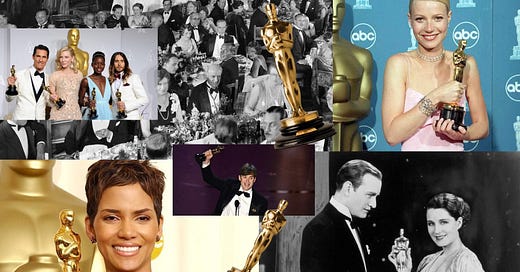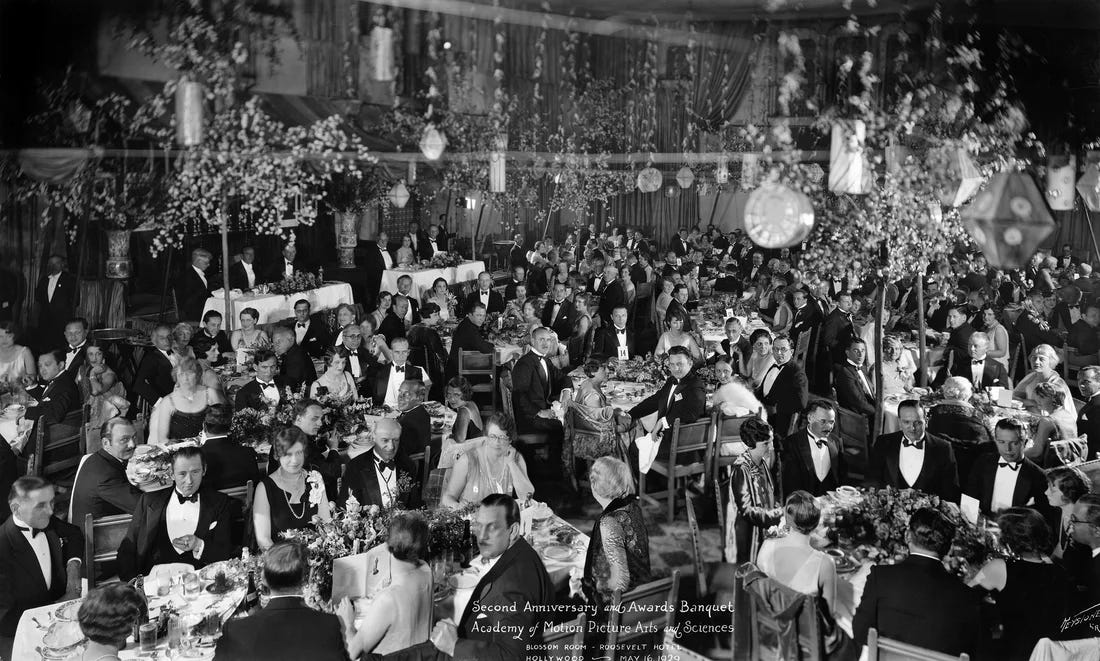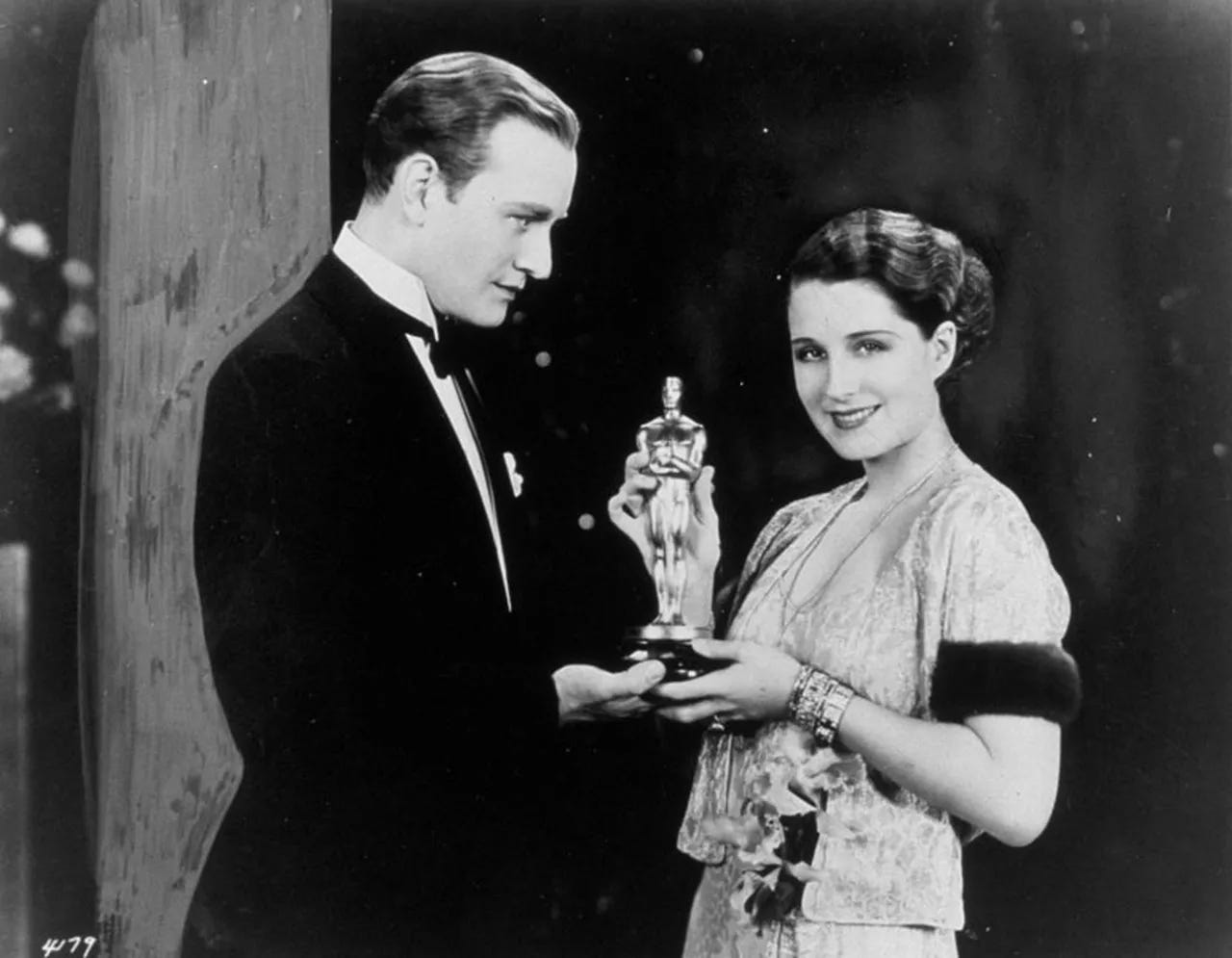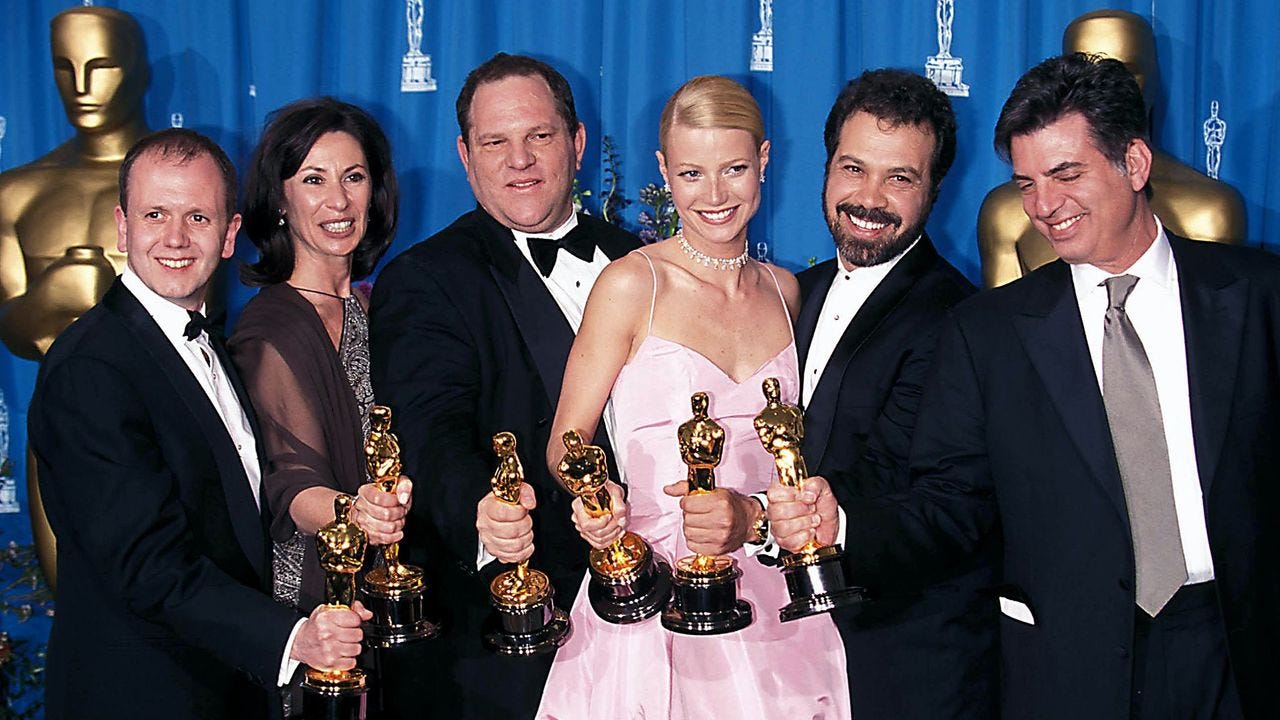Children learn which cultural facets have significance before they even understand what those cultural facets are. Take Tiger Woods, for instance. In the early aughts, I was too young to understand the repercussions of marital betrayal and drug abuse. But I understood that this man was important and that he was doing something bad, based on how many times his face appeared on supermarket tabloids, alongside the words “destroys marriage” and “sex scandal.” As an American adolescent in 2011, I didn’t understand the significance of a royal wedding, but I understood that the gravity must be weighty given my mom was setting her alarm to watch Kate and William wed in the early hours of Pacific Standard Time.
Growing up, the Oscars were this way for me too. A televised Sunday night awards show brought much excitement to my household, squarely crushing the anxieties about school and work on Monday morning. My mom would turn on E! at around two o’clock in the afternoon when the red carpet interviews began. We watched the starlets step out of limousines while eating cheese and crackers. I had my homework strewn across the kitchen table but struggled to focus as Giuliana Rancic asked A-list actresses who they were wearing, to which they would respond with a designer’s name.
Once the Academy Awards ceremony actually began, my interest waned slightly, but never completely. My family watched with bated breath as winners were announced and tearful speeches were performed, even though we hadn’t watched more than one or two of the nominated films. When you have no knowledge of the nominated pictures, the whole ceremony should read as quite boring, but somehow, it never was for me, even as a young kid.
There is an undeniable glamour attached to beautiful people accepting shiny trophies for high-brow art in Hollywood. And there was a clear cultural reverence for this ceremony that I could perceive early on. The way the films were discussed at this ceremony - as being “important work” or “telling important stories” - made the whole matter seem quite serious. The grace and fervor with which people spoke as they accepted these awards was entertainment in itself - exclaiming that they couldn’t believe it, that their dreams were coming true, and telling young people watching to never give up. These are, after all, actors accepting awards, not insurance salesmen - they know how to put on a good show, even when they aren’t being paid to perform, per se.
According to “A Brief History of the Oscars,” a two-page PDF found on The Academy’s website, the Academy of Motion Picture Arts and Sciences (AMPAS) was incorporated in 1927 in downtown Los Angeles to forge the goals of a new, unified film organization. One of these goals included “devising a method to honor outstanding achievements, thus encouraging higher levels of quality in all facets of motion picture production” - thus birthing the Academy Awards, commonly known as the Oscars.
However, AMPAS’ intentions weren’t as benevolent as this PDF makes them out to be, at least to Michael Schulman, author of Oscar Wars: A History of Hollywood in Gold, Sweat, and Tears. According to Schulman, there are two stories of how the Academy came to be: the first rests on Louis Mayer of Metro-Goldwyn-Mayer (MGM) hatching a utopian vision of promoting “harmony” within the film industry and advancing the art of motion pictures. The second reason is far less sweet: union busting.
By 1927, the business of motion pictures had become a billion-dollar industry, producing eight hundred features a year and employing 42,000 people. A hundred million people went to one of 25,000 movie theaters across the United States a week, and the studios producing such movies were worth some $65 million. As such, burgeoning actors like Conrad Nagel involved with Actors’ Equity - often subjected to seventeen-hour workdays and hazardous conditions - were fighting for their right to unionize. It was only a matter of time until other talent - directors and writers, for instance - banded together as well.
Concurrently, following World War I, films of the 1920s - and the actors that starred in them - became more risque - “more glamour, more extravagance, more sex,” Schulman writes. This development was incompatible with the lifestyles of small-town Christian reformers who had just pushed for Prohibition. Hollywood found itself threatened by federal censorship. As such, Mayer allied producers, directors, writers, actors, and technicians - a cross-section of Hollywood influence - to form a unified front against scandals and censorship threats, as well as prevent separate sects of professionals from forming their own unions. The Academy was born.
As a part of this new alliance, The Academy decided they would bestow “awards of merit for distinctive achievements,” though this was a small part of the organization’s initial mission. The first Academy Awards was held on May 16, 1929, at a private dinner at the Hollywood Roosevelt Hotel. For this first ceremony, winners were announced in the papers three months in advance and the ceremony itself lasted about fifteen minutes. It would be another decade or so until the Academy started using a sealed envelope to reveal the winners' names live, and another two decades until the ceremony was televised.
Today, the Academy Awards ceremony is one of the biggest primetime televised events of the year. It’s also inspired the formation of counterpart ceremonies - the Emmys for television, the Tonys for theater, and the Grammys for music. There are tangible benefits to winning an Academy Award, beyond recognition for outstanding merit. Actors can see an estimated 20% boost in pay for their next role following a win, which can last for several movies or even their entire careers. Nominated films often experience a boost in box office sales and streaming views, known as the “Oscar bump.” Further, winners experience considerable marketability following an Oscar win, enhancing their desirability in the industry and allowing them leverage to demand more desirable compensation, known as the “Oscar effect.”
As such, distributors put a great deal of time and money into marketing their films, actors, and directors during Oscar season. In 2024, Best Picture winner Oppenheimer spent the most on TV advertising during awards season - shelling out an estimated $25.7 million on national TV media from January to February 2024 alone. Many Oscar contenders will premiere at splashy venues, like the Venice or Cannes Film Festivals to improve appeal. Actors and directors will run mammoth press junkets, appearing on daytime or late-night talk shows, or participating in Variety Studio: Actors on Actors or The Hollywood Reporter Roundtables series. Many argue that “recency bias” affects nominations, and that many studios release films later in the year to improve their chances of being recalled come nomination season.
Art-making is not an intrinsically competitive practice, yet when humans - Americans, in particular - assign competition to it, the drive to triumph comes in full force. Competition imposes hierarchy upon previously unstratified systems. When given the option to win or lose, we always want to win, even if we don’t fully understand why. In the context of the Academy Awards and Hollywood, Schulman writes:
“As soon as the Academy Award was invented, people in Hollywood wanted it, because it created an organizing principle for power and prestige in a town whose hierarchy is always shifting beneath its denizens’ feet.”
I view the Academy Awards - and the Grammys, Emmys, and so on - like most people probably do: I celebrate when my favorite performers win, and deem the Academy corrupted when they lose. This mindset extends to my general view of accolades - they are great to receive, but not completely necessary to have a fruitful career doing what you love. In a viral interview last year, Oscar-nominated actor Andrew Garfield told interviewer Amelia Dimoldenberg that he’s given up on the dream of winning and that the Academy Awards have meant something to him in the past that they don’t anymore. Dimoldenberg jokingly quips that he’ll probably win as soon as he stops caring.
It’s tough to hold these two truths in your head though. To know that conventional “accolades” are manufactured by a subjective voice or body of voices, some of which - like the Academy - contain nefarious origins. And to also know that it’s worth graciously accepting your flowers if and when they do come, even if you previously deemed such accolades bogus.
But how much stock should an artist place in “achieving” before they become what many deem a “sell-out”? When an artist is performing with the intention of winning an award, it can make their performance feel less pure and merited. Within the world of writing - and more specifically, blogging - writing with the intention to eventually make a living off your words is sometimes viewed similarly. Actors and writers alike walk a fine line between wanting to produce good and honest work, while also marketing that work just the right amount, ensuring that it’s shared and consumed widely to have the greatest chance of succeeding, but also attempting to appear the right amount of uninterested in “success” out of humility. Trying to make a living off art-making in a society that increasingly devalues artists - not necessarily their output, but usually the artists themselves - is a precarious and paradoxical pursuit.
The origins of the Academy Awards certainly emphasize that these modern metrics of “merit” are man-made and often conceived to misguide. If we can get these artists chasing their tails and making enemies out of one another to the end of winning a trophy, perhaps they will be too preoccupied to think of organizing and demanding fair compensation and safe working conditions - matters that would more directly improve their lives than paperweights. For this reason, awards season is perfectly emblematic of the American corporate ladder - climbing and climbing for reasons unknown, getting bigger crumbs of the pie until you can eventually - with enough hard work and talent - be the one in charge of burying the bodies. Strategically placed goalposts for strategically envisioned ends.
Of course, cultural facets change shape as culture itself changes. Today, the “Academy Awards” are viewed with the utmost seriousness and prestige - their cultural significance cannot be undermined. They are a glamorous way to reward glamorous people in Hollywood. But before that, they were a peculiar, green idea to perhaps disillusion and further impose hierarchy. And in this vein, everything was once an idea. A means to an end, an effect to a cause. An Oscar, a CEO, a king, and so on.










this is a great look into the history of the oscars that i never knew about!! i’m wondering what you’d think of the SAG awards (SAG is the labor union for screen actors).
considering the history of the oscars, it seems pretty radical for the union itself to hold an alternative to the oscars honoring the work of people in the union, especially with the recent SAG strike. i wonder how different hollywood would be if the general public looked at the sag awards with the same prestige and respect as the oscars.